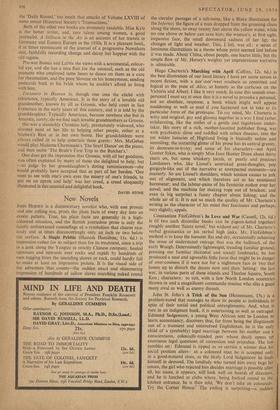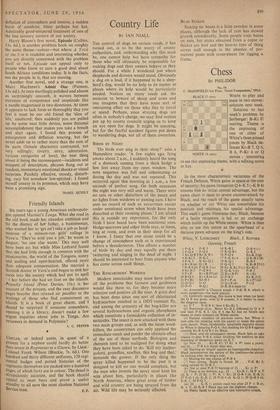New Novels JOHN HERSEY is a documentary novelist who, with
one prosaic and one rolling eye, prods the plain facts of every day into an exotic pattern. True, his plain facts are generally in a high- coloured situation, and the flattish journalese prose is only the faintly embarrassed camouflage of a symbolism that churns rest- lessly and at times disconcertingly only an inch or two below the surface. A Single Pebble (Hamish Hamilton, 11s. 6d.) is impressive rather for its subject than for its treatment, since a trip in a junk along the Yangtze in strictly Chinese company, hauled upstream and upwards over rocks and rapids by hundreds of men tugging from the unending shores or rock, could hardly fail to make at least an impressive picture. It is the visual side of the adventure that counts—the sudden exact and shimmering impression of hundreds of sallow slaves marching naked round
the circular passages of a salt-mine, like a Blake illustration for the Inferno; the figure of a man dropped from the groaning chain along the shore, to sway twenty feet above the yellow water, while no one above or below can save him; the woman's, at first sight, impassive face, the small downward sadness of her lip; the changes of light and weather. This, I felt, was all: a series of luminous illustrations to a theme whose point seemed lost before it was made. About China, about people, one learns little; but the simple flow of Mr. Hersey's weighty yet unpretentious narrative is admirable.
Hugo Charteris's Marching with April (Collins, 12s. 6d.) is the best illustration of our local lunacy I have yet come across in recent fiction, with a nor'-nor'-west madness as contrived and logical as the puns of Alice, as homely as the curlicues on the Victoria and Albert. I like it very much. In .case this sounds over- personal I must say at once that it is a novel to provoke a personal. not an absolute, response, a book which might well appear maddening as well as mad if you happened not to take to its particular form of the grotesque. To my mind, Mr. Charteris is witty and original, gay and gloomy together in a way I find rather exhilarating, like the smiles of a gentle and lugubrious under- taker. His story of a rich, mothee-haunted publisher flung, wet with psychiatric slime and raddled with urban diseases, into the yet wilder lunacies of Highland living is basically sedate and unsmiling; the stuttering' glitter of his prose has its central gravity, its decorum-in-irony; and some of his characters—not April Gunter Sykes, who is simply Miss Joan Hunter Dunn about thirty years on, but some whiskery locals, or pearly and precious Londoners who, like Lionel's asterisked great-thoughts, pop gargoyle-like out of the narrative at unexpected moments—are masterly. So are Lionel's shoulders, which tension causes to jerk out of alignment, and which therefore act as his emotional barometer; and the labour-pains of his favourite author over her novel; and the machine for making rope out of bracken; and even (a big surprise) a funny chapter about fishing; and the whole air of it. It is not so much the quality of Mr. Charteris's writing as the character of his mind that fascinates and perhaps, very slightly, appals.
Constantine FitzGibbon's In Love and War (Cassell, 12s. 6d.) is (if two such dissimilar books can be pigeon-holed together) roughly another 'funny novel,' but without any of Mr. Charteris's verbal gymnastics or his verbal high jinks. Mr. FitzGibbon's method is to keep the humour flat and dry, occasionally achieving the sense of understated outrage that was the hallmark of the early Waugh. Determinedly lightweight, treading familiar ground. pointing out familiar (fictional and social) landmarks, he has produced a neat and agreeable little farce that might be in danger of over-cosiness if it were not for a nightmare face or two that looms up to disturb the dream now and then. Setting: the last war, in various parts of these islands and Thurloe Square, South Ken.; characters: to suit, with a few North London eccentrics thrown in and a magnificent commando maniac who slits a good many rival as well as enemy throats.
John St. John's A Trick of the Sun (Heinemann, 15s.) is a problem-novel that manages to show its people as individuals in spite of their social and political entanglements. And, what is rare in an indignant book, it is entertaining as well as outraged. Edmund Sedgemoor, a young West African sent to London to learn accountancy, discovers that, far from being the illegitimate son of tr transient and uninvolved Englishman, he is the only child of a (probably) legal marriage between his mother and a conscientious, colonially-minded peer whose death opens up enormous legal questions of succession and prejudice. The law rumbles on : Edmund is tipped as so certain a winner that hip social position alters: as a coloured man he is accepted only in a good-natured slum, as the likely Lord Sedgemoor he finds himself in demand. The landlady who turned him away begs hi', return, the girl who rejected him decides marriage is possible after all, his name, it appears, will look well on boards of directors. and he is lunched at clubs where, being barked round to the kitchen entrance, he is then told} 'We don't take on coloureds. Try the Corner House.' The ending is surprising—a sudden
deflation of atmosphere and tension, a sudden burst of sunshine, bitter perhaps but hot. Admirably good-tempered treatment of one of the less savoury corners of our society,
Harry Bloom's first novel, Episode (Collins, 13s. 6d.), is another problem book on roughly the same theme—colour--but where A Trick of the S-rn is readable and interesting whether you are directly concerned with the problem itself or not, Episode can appeal only to People who know or care a good deal about South African conditions today. It is the facts, not the people in it, that are moving.
Another first novel, and a strange one, is Mairi Maclnnes's Admit One (Putnam, 13s. 6d.). At once startlingly polished and almost as surprisingly uncouth, it wavers between extremes of competence and ineptitude like a needle magnetised in two directions. At times it appears to lack form so thoroughly that you feel it must be our old friend the 'slice of life,' unaltered; then suddenly you are pulled up by some neat little device, some fictional accomplishment that makes you take a breath and start again. I found this process of anticipation and deflation wearing, but the novel adds up to rather more than the sum of its parts (female characters contrasted, not very tellingly; rivalry, envy, admiration, various categories of love), the best thing about it being the inconsequent—incidents and snippets of description, phrases flung out at random, momentary emotional shocks or visual surprises. Patchily effective, moody, disturb- ing, racy but somehow low-spirited: I found myself uneasy in its presence, which may have been a promising sign.
ISABEL QUIGLY



































 Previous page
Previous page